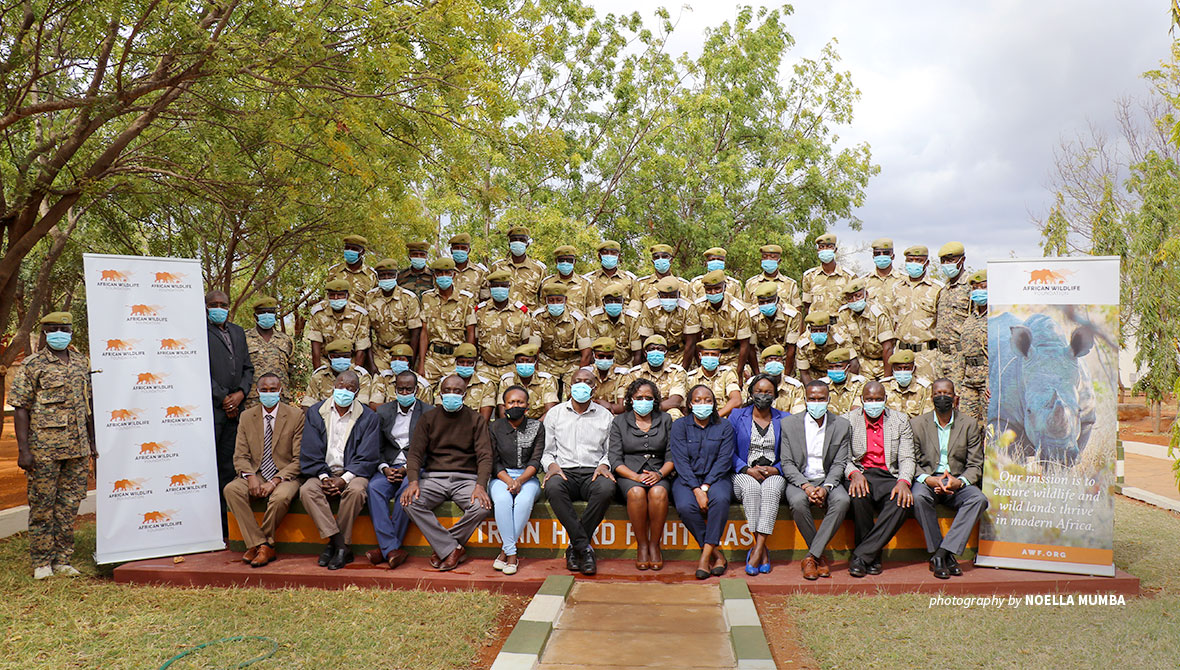AWF Partners with KWS to Train Junior Officers on Digital and Electronic Evidence
General Inquiries
Tel:+254 711 063 000
Ngong Road, Karen, P.O. Box 310
00502 Nairobi, Kenya

From August 16-22, 2021, the African Wildlife Foundation (AWF), in collaboration with the Kenya Wildlife Service (KWS), conducted Digital and Electronic Evidence training at the KWS Law Enforcement Academy (KWS LEA) in Manyani, Taita Taveta County. The week-long training targeted 109 KWS Junior Commanders from across the country who are currently taking the Junior Officers Course. Simon Gitau, KWS LEA Commandant, officially opened the workshop.
The training aims to build the trainees' capacity as first responders in wildlife crime, improving their skills in the identification, acquisition, storage, chain of custody, and case management of digital evidence. Although the trainers were drawn from KWS elite investigation and intelligence teams, these officers had previously undergone several digital forensic training sessions organized by AWF, in conjunction with the Directorate of Criminal Investigations Digital Forensics Lab and Israel-based mobile forensic company Cellebrite.
During his address to the participants, AWF’s Cybercrime Investigation Manager Ernest Agina expounded on AWF’s Counter Wildlife Trafficking work. Emphasizing the theory of change, he said, “We have successfully trained and certified fifteen mobile forensic experts and forty-eight first responders and supported four special investigations. Today, we have KWS serving officers who have attended both pieces of training with us to deliver. They will train you as the first responder to wildlife cybercrimes, and we depend on your uptake of the content. The success of this training will be dependent on the application of the skills gained. Only that know-how coupled with your training as an enforcement officer will stop wildlife cybercrimes.”
“Criminal groups have worked to thwart law enforcement efforts, and one of the strategies they have adopted is shifting their illegal activities online. KWS is moving with speed to strengthen its capacity in carrying out wildlife cybercrime investigations,” said Celina Mwangangi, the acting Head of Investigations at KWS, as she highlighted the importance of training to junior officers and conservation efforts in Kenya.
Facilitated by AWF, KWS, and KWS LEA, the Junior Officers were trained on evidence management, storage, and disposal procedures, managing crime scenes, handling digital and electronic evidence, human rights, case management, and testifying in court. In addition, they had a chance to be practically tested on managing crime scenes. During the final day of the training, the trainees were joined by magistrates and prosecutors. The prosecutors were from the region who shared tips and guidelines on how to present cases. Benson Onsongo, the Acting Chief Instructor at KWS LEA, expressed confidence that the trainees will gain prosecution and judicial proceedings skills. He stressed that the knowledge acquired will help detect and combat wildlife cybercrime.
At the end of the workshop, the 109 KWS Junior Commanders were awarded certificates at the closing ceremony. AWF’s Legal Officer, Benson Kasyoki, challenged the trainees to have a good mastery of the Wildlife Act in the Constitution of Kenya 2010 as it comes in handy in court proceedings.
“I would like to thank AWF for partnering with KWS to conduct this much-needed training and building the capacity of KWS Junior Commanders in handling digital and electronic evidence. I would also like to thank the magistrates and prosecutors for mentoring the trainees on judicial proceedings,” said Mr. Gitau in his closing remarks.
With wildlife crime shifting to digital spaces, it is crucial to use the same platforms to curb the vice. The trainees are expected to go back to their posts and apply the knowledge and skills and share it with their colleagues. This will ensure sustainability in the training of trainers.